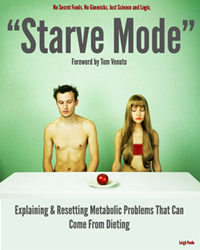The Truth About Starvation Mode with Leigh Peele
Today, I’m really excited to share this awesome, NO BS interview on metabolism. I recently spoke to a super smart cookie, Leigh Peele who is a passionate fitness writer and the author of Starve Mode and Fat Loss Troubleshoot.
If you’ve ever felt confused about metabolism, you’re going to love this.
In the cool interview, you’ll discover:
- The Truth About Starvation Mode
– The Most Important Advice Ever for Calculating Your Daily Caloric Intake
– Popular Myths about a “Broken Metabolism” You Must Ignore
– How You Can Speed Up Your Metabolism Today
– The #1 Tip for Boosting a sluggish Metabolism
And much more…
Listen to the entire interview here.
To download this interview (right click the above link and save)
Click Here To Learn More About Leigh Peele
Kate: Hey! This is Kate Vidulich from FatLossAccelerators.com and welcome to today’s call. Now I’m totally pumped for this one because on the phone, I’ve got a very special guest, Leigh Peele from LeighPeele.com here joining me. Thanks so much for taking the time out of your day to chat with us and welcome to the call.
Leigh: Thank you so much for having me, Kate. I’m very happy to be here.
Kate: Awesome. It’s great to have you on today. I’ve been following your work for quite some time now but for those listeners who may not know you, why don’t you start off by introducing yourself so I don’t miss anything and you can give us a little bit of your background.
Leigh: The background spiel, I am Leigh Peele. I am a National Academy of Sports Medicine certified personal trainer. That is my chief certificate. I recently got certified as a golf specialist as well.
Kate: Really? How cool is that!
Leigh: I have to get it to use every year. My dad plays golf. He loves golf and he doesn’t get to play it very often but he loves golf. I was looking at things that I could get and things that I could get certified in. I thought you know what? Just for kicks, just for fun, I’m going to get certified as a golf specialist so I did. I got certified as a golf specialist. You can do a lot of things as a daughter to make your dad proud and I think this probably hits the top of it for him. It makes make my father really happy. Nothing else has really quite tipped the hat like me becoming certified as a golf specialist and the cheesy grin that he had, which was very fantastic.
So I have those certifications and my chief love of course there is nutrition and body composition, fat loss, metabolism, research, things like that. It is kind of my addiction, if you will, regarding this kind of field in the fitness industry. I love mechanics and I love training and things like that as well. I don’t want to knock it but what kind of gets me and the studies I get the most excited about, the things I get most jazzed about, are definitely the nutrition, weight manipulation, and things like that. So that’s kind of my thing.
But I’ve been doing this for years now. I’ve worked with people in person, I worked with people online and I couldn’t be happier. I tried to knock out some books, just keeping this thing going and trying to reach as many people as I can reach. It’s just been an amazing journey and I couldn’t be more excited.
Kate: That’s awesome. It’s really cool and I think what you were saying there about just doing stuff that you love, it’s certainly can prove me sometimes to look back and go wow! I’m doing what I love every day and helping people in the process.
Leigh: Yeah. Absolutely. This is definitely one of those things I would do regardless of being paid.
Kate: Yeah, and I think that’s the same for most or even all fitness professionals, I would hope.
Leigh: I would hope so, too. Yeah, it’s a pretty fun job. We’re all quite a happy bunch whenever we’re doing our job. I think you have to be that way because it has to be infectious because it’s hard to get people to do some of the things that we get them to do sometimes. I think if you’re not happy doing what you’re doing, it’s not going to work really well, especially with this job.
Kate: Absolutely. It’s so very, very true. So we’ve gone philosophical right from the start. Let’s talk a little bit more about some of the nutrition stuff. Particularly I wanted to chat with you little about starvation mode. It’s splashed around in magazines and on websites and things like that. What I really want to know is do you think starvation mode does actually exist and if it does, what is it?
Leigh: That’s the big question. Does it exist? I think a lot of the issue with starvation mode as a phrase and what I relate it to a lot, especially to other trainers, is the phrase itself has gotten very confused and very manipulated over the years. Does it exist in a technical sense? I believe it does. It’s how you explain what it is that—wherein lies the issue.
It’s a lot like “toning” in the training world and that’s how I relay it a lot. It’s that technically, we don’t really like the phrase “toning.” We do try to kind of stay away from it because it doesn’t really actually mean anything but in a semantic sense if you got into an argument, you could find a definition to toning which is the increase of muscle definition and the removal of body fat. That is, in a manner of speaking, toning.
With starvation mode, it’s a little bit of a similar topic. It does exist in the sense that your body makes adjustments when we go into diet down and adapt and it has adaptations that take place to a dieting down situation. That is a very true statement so when you hear people say or when you start dieting down, your body goes into starvation mode, technically that is a big true statement to make.
But what they’re saying starvation mode is and what people are thinking it is is where the complication comes in and usually the wrong statements come into play. What it actually is is whenever we go into a deficit, whenever we do diet down in order to lose fat—that is the only way to lose fat, to go into a caloric deficit in order to pull stores of fat from our body— we have certain metabolic adjustments that take place, certain hormones and various things in the body are going to alter.
So things go up, cortisol, for example, or appetite. Some things go down, leptin or various testosterone hormones and things like that. So we have alterations and changes that happen almost immediately. In some studies, we see that leptin, for example, decreases as much as over 50% in one week in females. So we have alterations in these hormones. We have changes. We have things that take place but it has to happen because it’s the only way to lose fat. There’s really nothing we can do about that.
The problem that comes in is when we go too long, we got too hard, and we don’t try to come out of that phase with feeding and eating at a normal maintenance need for nutrition and we basically try to drive ourselves into the ground and out metabolic adaptations get a little too aggressive and we start to feel the side effect of those things a little too intensely.
It does not that mean we can’t lose fat in the absence or well in the deficit. It does not mean that some of the things that you hear, like oh you start storing fat instead of burning it and all these kinds of things—those are completely mythical statements. They’re not true but there are a lot of problems that can be in between, from water retention to decrease in caloric burn, therefore making deficits harder and harder to reach, things like that.
So there are a lot of angles that you can discuss when talking about starvation mode but the actual phrase, that’s where we end up having a lot of problems and I think that’s where a lot of arguments come into play. Adaptations, yes, technically the term is adaptive thermogenesis or metabolic adaptations but yes, starvation mode, I don’t personally use it any more, more because of the connotation tied to it than such it is as the absolute wrong term. But I obviously use it in a tongue-in-cheek manner with the title of the book and when I’m doing articles and things like that because that’s what people are expecting to see when they’re talking about these kinds of topics.
Kate: Absolutely and I think the whole eat every three hours or your body is going to shut down and go into starvation mode, oh god.
Leigh: Yeah, there are all these kinds of things and I think, obviously, to be fair of any trainer out there that has ever said it—and there are some things that I said in my time—I think the intention is good and we’re coming from this place of well, you should you fuel your body as much as possible and if you do these things, you’re going to be in the mode for optimal metabolic place. It’s not like it’s not coming from a good-intentioned place or that there isn’t some sort of logic behind it on a certain level.
It’s the absolute statements that we make about it that can be wrong and when we look at the research, for example, in the meal timing, we see that there really isn’t any difference in how many meals we eat in the day and how we space things out for most individuals. But there also can be arguments for that as well. I think what we can look at more and what I always I tell my clients or readers is that compliance is the 100% thing you should be the most concerned out at all times. What diet allows you to comply and what diet allows you to get the most out of your situation that you’re in right now? What meal timing? What kind of protein or macronutrients in there or like the gram amounts in carbohydrates? All these types of things, what else you comply and that should be first and foremost because the compliance is going to help you reach the goal, whatever the goal is that you’re trying to achieve.
Obviously, I deal with fat loss the most but a lot of these myths that are pertaining to: you can only do these things. If you don’t do these things your metabolism is going to crash or if you do cardio, your metabolism is going to crash, or if you do any of these things, your metabolism is going to crash. Or if you don’t do these things, you’re going to have a sluggish metabolism and I’m sure we’ll cover all those kinds of topics. But these are the kinds of things that I try and hush because they create what I find a kind of neuroticism in the clients where they’re like do I go left or do I go right? Do I zig or do I zag? They end up getting confused. They hear one thing from one person and one thing from another. I find that that confusion leads to a standstill and that’s exactly what we don’t want. We don’t want them to be in a standstill. We want them to be progressing forward. That’s what I always try and do, get people progressing forward as quickly as possible and sometimes you have to remove myths to do that.
Kate: Yeah, absolutely. I think even with myself when you said, I think I used to advise people to eat every hours because that time it was science. There were no conflicting studies saying that this wasn’t the right way to go about it but I’ve said it before.
Leigh: Yeah, and I don’t think anyone was going to be harmed by that. I don’t either. There are still some bodybuilders to this day that no matter, regardless of what the studies say, they’re going to stand by it. It also makes sense for a lot of people to do that. It makes perfect sense for a lot of people to do that. It’s still a great strategy. There’s nothing wrong with that strategy.
I think the only difference is that we tie it to the terms “this is the optimal way” or “you’re going to destroy something by not.” I think that’s where the little devils in the details are. But yeah, I used to advise my clients to eat frequently as well. It’s what we did. We started analyzing and critically thinking, more than we find different routes of things and that’s okay.
Kate: Exactly. I think you’re right. As long as people are moving forward or in some direction and not just sitting or standing still and doing nothing, that’s the most important thing.
Leigh: Absolutely. Paralysis whatever analysis, that’s what we try to avoid as much as possible.
Kate: Yeah, I think that’s a girl thing where we tend to read into everything and overanalyze, for those anyway.
Leigh: Us human beings? No. Never. ![]()
—— End of part One ——–
To be continued.













